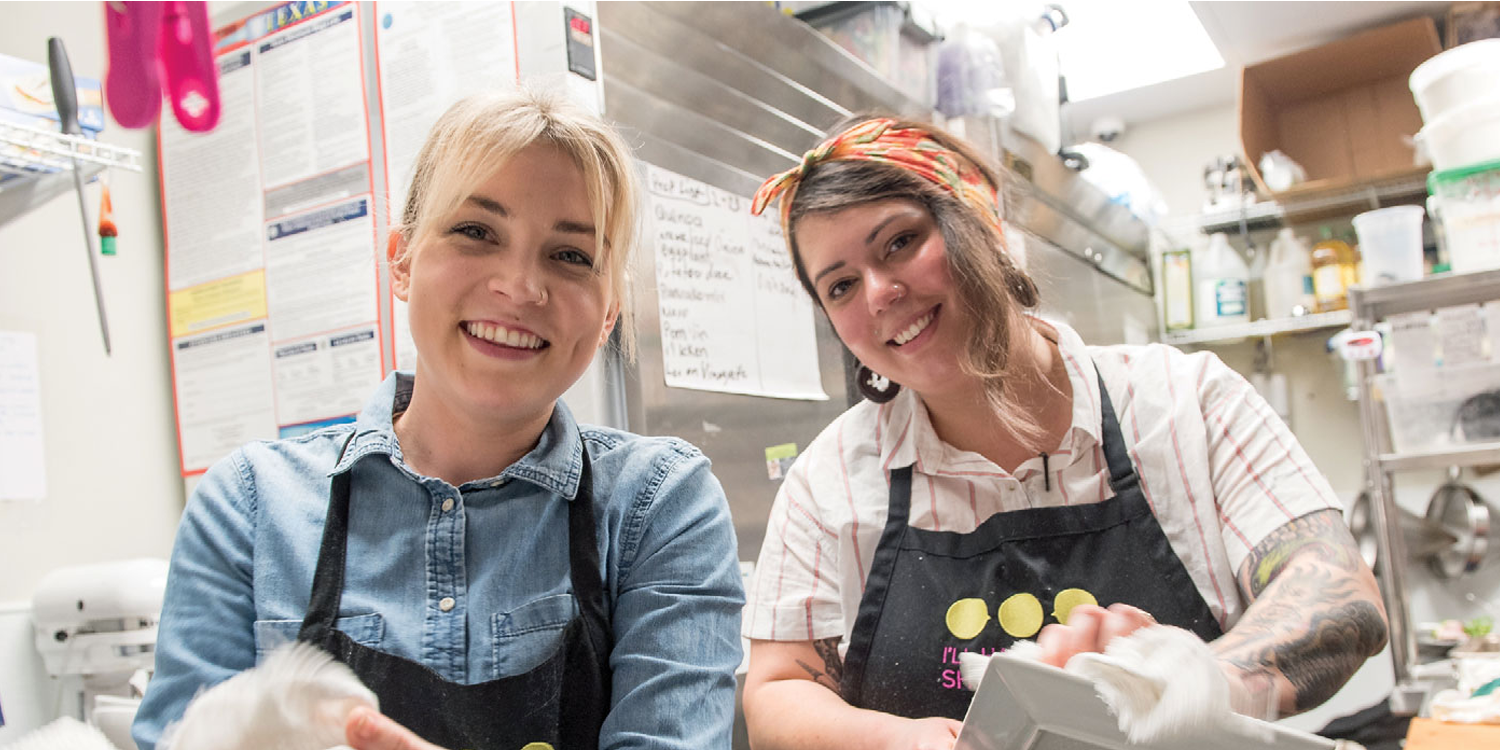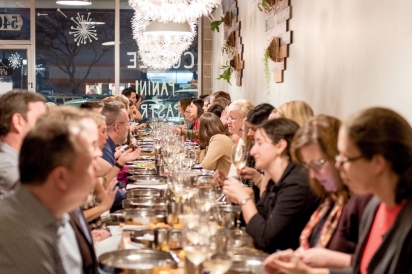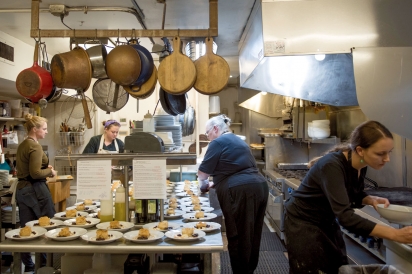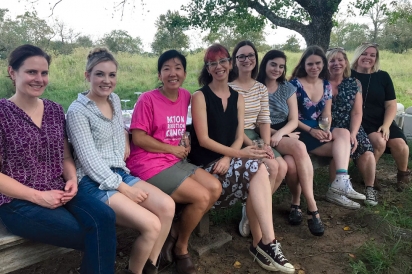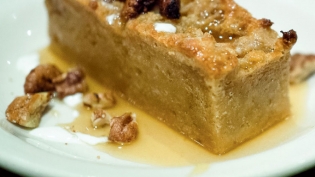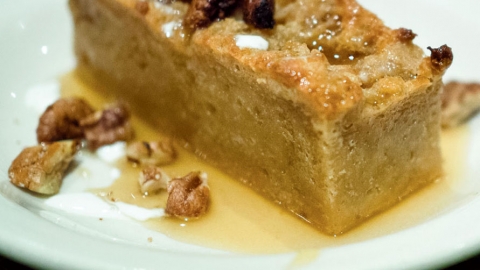IHWSH: Cool Chicks on a Mission for Women's Healthcare
Lori Choi takes matters into her own hands. Rather than brooding over frustration with a broken healthcare system, the vascular surgeon has spent the better part of the past year championing reproductive justice in Texas. Choi, who is married to chef Ryan Pera of Coltivare and Revival Market, used her culinary connections to enlist a flock of female chefs in the fight for women’s rights.
Some might call Choi a tough bird. The veteran marathon runner juggles her career as a traveling physician with her newfound role as a community organizer. But her face was devoid of fatigue and bright with a smile when she stood before a room full of guests at a fundraising dinner in February. She wore the same black apron as the chefs encircling her, with the words “I’ll Have What She’s Having” stitched in pink letters. For the folks in the room, what was once menu talk is now the name of an activist collaborative Choi started with three chefs and a goat farmer in 2017.
Her smile gave way to stoicism and her voice transcended the clanking of knives on plates as she told crowd what was what.
“If we do not take care of our women, our families and communities are going to fail. And I’m not going to wait for us to flip the House and flip the Senate and flip the presidency.” She persisted, “Let’s stand up for the women and they will understand that we are behind them and then they will go out and vote!” Choi’s call was met with hoots and hollers from a well-fed audience.
What started as a fundraising effort has blossomed into an alliance of about 100 chefs, farmers, doctors and activists united to make the dearth of women’s healthcare in Texas literally palatable. The February dinner of shrimp cakes and curry spiced by the hand of chef Anita Jaisinghani, owner of Pondicheri, was the latest in a series of pop-up events hosted by I’ll Have What She’s Having (IHWSH).
In less than a year the group has raised thousands of dollars for thousands of mothers, daughters, sisters and wives whose biology demands everything from tampons to checkups to lifesaving treatment.
But the women who go without care number in the millions. Acutely aware of this, IHWSH is raising the bar to a $1 million fundraising goal for their Something for Everyone Inaugural Benefit on April 8 at The Ivy & James in Evelyn’s Park Conservancy. Over the course of one evening, chefs and bartenders from the ranks of celebrity to up-andcomer will work elbow to elbow to host a three-part extravaganza. Proceeds from every sip, nibble and bite will go to four organizations that break down barriers to women’s healthcare.
Deep-rooted appreciation for good food makes Houston ripe for revolutionary talks at the dinner table. “We’re such a foodie town, which kind of draws everybody in,” said Choi. At the pop-up in February, guests discussed cuts to Medicaid. They discussed the high cost of doctor visits. They discussed the walls built to prevent women from getting abortions. They questioned why it is so difficult for women to get birth control and cancer screenings and a litany of other healthcare services that many would describe as fundamental human rights.
In an era of so-called “skinny budgets,” funds for women’s care are among the first to suffer blows from the legislative axe. A predominantly male government privileges a financial pecking order that’s ineffective at best, and outright pernicious when the country’s baffling motherhood mortality rate is brought into the equation. The Centers for Disease Control and Prevention estimates at least 17 maternal deaths per 100,000 live births in the United States—a ratio higher than any other nation in the developed world.
Look no further for evidence of blood on lawmakers’ hands than Texas, where the motherhood mortality rate is among the highest in the country and funds for reproductive care are among the lowest. After the state butchered its family-planning budget in 2011, the motherhood mortality rate soared as clinics reliant on government funds were forced to close.
Affordable healthcare is hard to come by, especially for women who live paycheck-to-paycheck and for those who earn too much to qualify for government care but not enough to pay for insurance. Faced with the option of embracing Obamacare or declining millions of dollars in federal funding, state legislators refused to expand Medicare. Now the land where everything’s bigger is also home to the largest rate of uninsured people in the country.
Some women qualify for limited services through the Healthy Texas Women program, but they must navigate what Choi described as “the maze of care” in the event of an abnormal screening. If a woman needs to see a specialist she is referred to one that may or may not be able to accommodate her shoestring budget. And shuffling from doctor to doctor takes time. Multiple appointments spread over multiple days take time away from work and hours out of paychecks. The situation is all the more complicated for women without transportation and those who live in rural areas.
Dalia Zelko needs no convincing about the urgency of affordable healthcare. Years before she was a co-owner of The Ivy & James, she was an uninsured student with cancer. Were it not for the services she received through Planned Parenthood, she might not be around to host the IHWSH benefit at the restaurant she opened with her wife, chef Jamie Zelko, in May 2017.
The Zelkos say they are just as energized by the energy pulsing through the women of IHWSH as they are by the upcoming event. “When you’re working together for a common goal that’s not necessarily money, that means you’re there because you want to be there because you believe in the same things,” said Dalia.
From the union of kitchen and cause, a surprising sisterhood has hatched among the women of IHWSH. Unprecedented are the friendships, partnerships and mentorships formed through the smorgasbord of newbies and seasoned professionals. Jamie Zelko, a veteran who rose through the ranks of “the traditional brigade system,” said that’s part of what makes her happy to contribute. “I never would have thought that you would see so many professional women come together. ... We are so excited to host and be a part of I’ll Have What She’s Having.”
The crew isn’t stopping in April. Once the dishes are done the collaborators will continue to advocate for women’s needs—including their own. Many of those working overtime to help others are themselves without insurance, “trapped in a lower-income bracket doing what they love,” said Choi. The visionary hopes this year IHWSH will grow into a network of services, including healthcare, for the advocates. She hopes the idea will catch on across industries. She wants the women to set a precedent. It seems they already have.
Cat Modlin-Jackson comes from a long line of women who grow greens for nourishment, cook for community and set the table for social justice.


